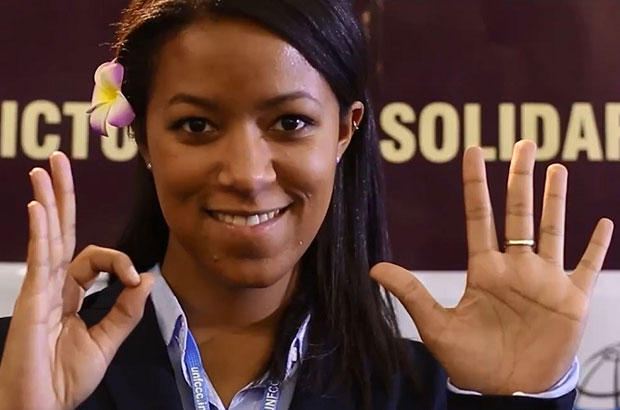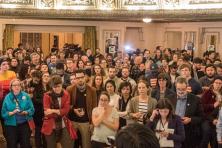Two is too much. A 2 degree C. increase in the global average temperature – the working redline for climate catastrophe – would mean a “significantly different planet,” disrupting food and water supplies, inundating coastal cities, obliterating island nations… Look at what 1 degree is doing already, as extreme record rainfall reports come in almost daily.
Climate justice advocates, led by the world’s most vulnerable nations, are pushing in Paris to move the target to 1.5 degrees C. Science, sanity, and moral responsibility are with them, but rarely are those enough to win the day. Sober COP-watchers gave the drive for 1.5 little chance to prevail, as Big Fossil continues to box the negotiators.
But it looks like they just might pull it off. Mark Hertsgaard has a terrific piece explaining how and why. The context for the climate talks has shifted, as a swelling movement for climate justice presses demands for scientific rigor and social justice on national negotiators. There’s almost as much drama in Paris right now around how the climate movement will work its will at the end of the week as there is around the language of the final agreement. The November 13 attacks made it impossible to go forward with immense planned marches, but activists have regrouped; climate negotiators are not the only locus of power in town.
This – as much as the climate agreement text – is the news from Paris: While the UN process and the ultimate agreement is a critical barometer of global will for climate action, it’s not the motive force. Negotiators will move within the political space available, but that space is being expanded by the irresistible momentum of the climate movement; by state and local leaders engineering the transition on the ground; by the growing groundswell of divestment; by clean energy innovation and deployment sweeping global energy markets. You can feel the transition lurching into gear, and there’s a sense here that the climate agreement will memorialize its progress rather than drive it.
A more responsible temperature target – one that saves millions of lives and quite a few nations – now seems to be within the emerging political space for climate action. But it could also be a diversion – a way to placate the growing movement for climate stabilization without doing the hard stuff. If the final text says 1.5, with no more serious commitment to achieving it than we’ve seen to 2 degrees, it won’t be much of a victory.
Don’t get me wrong – symbols matter in the climate fight… a lot. But this is COP 21, and we are well past the time when vague commitments to scientific abstractions offer much hope. How will we know 1.5 is more than a binkie?
- Show us the ambition: Meeting current emission reduction commitments (INDCs) in the draft agreement would lead to a global temperature increase of around 3 degrees C. That’s what nations are committing to DO, and until they step up with much stronger commitments, 1.5 is fluff. Key outcomes of the agreement must include a rapid cycle for “ratcheting up” those commitments to align with 1.5, a pledge to completely decarbonize the energy system by 2050, and a legal framework that offers real accountability for results.
- And, of course, the money: Developing countries DID little to create the problem and HAVE little with which to battle it. Richer countries need to finance clean development, support adaptation to inevitable impacts, and pony up for damages caused by their emissions. This is a matter of fundamental fairness, but it’s also a key to unlocking more aggressive emission reduction commitments. OXFAM’s Heather Coleman draws a bead on what’s needed here.
- Deliver on equity: Justice is at the practical core of the climate challenge. Commitments to indigenous rights, just transition for workers, racial, gender, and intergenerational equity have been shunted from the operational text in Article 2 to the pre-amble -- Article Lip-Service. Stronger emission reduction commitments, finance, and respecting basic rights are necessary parts of the “solidarity package.” The final agreement will be both wrong and ineffective if it fails to deliver all 3.
1.5 is the right and necessary goal. The Paris Agreement should embrace it – with arms and legs, hands and feet, heart and wallet, not just lips.
And whatever the negotiators do, the ball’s back in our court next week.




